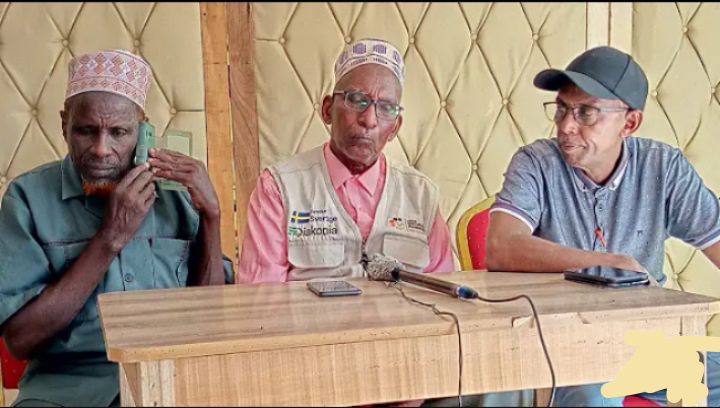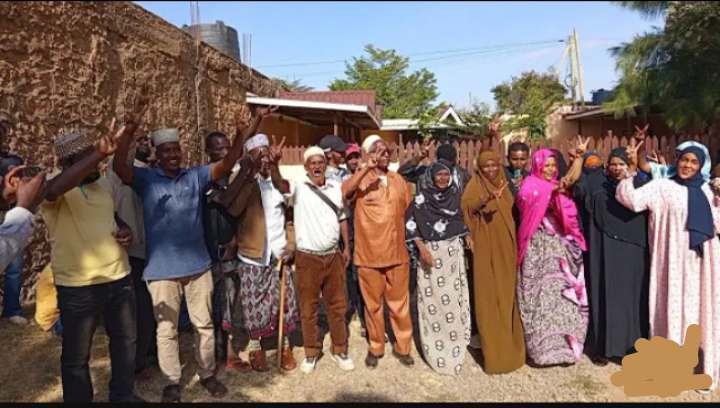In a dramatic escalation of tensions within Isiolo County’s Somali community, the Somali Council of Elders, led by Chairperson Abdullahi Shariff and Secretary-General Idle Hassan, has vehemently rejected a recent announcement by a faction of sub-clan leaders calling for the council’s dissolution.
The serving council, a cornerstone of community leadership and unity, has dismissed the move as illegitimate, citing procedural violations and accusing unnamed political figures of orchestrating the push to destabilize their authority.
This leadership dispute has exposed deep-seated divisions within the community, threatening the fragile cohesion that the council has worked tirelessly to foster.
As the row deepens, the council’s leadership remains resolute, vowing to uphold their mandate and continue serving the Somali community with unwavering commitment.
A Defiant Stand Against Dissolution
The controversy erupted when a group claiming to represent over ten Somali sub-clans declared the dissolution of the Council of Elders, asserting that the council’s term had expired and that it no longer held the mandate to represent the community.

The faction demanded fresh elections within 14 days to install a new leadership team, framing their move as a necessary step toward reform and unity.
However, the incumbent council, under the steadfast leadership of Abdullahi Shariff and Idle Hassan, swiftly rebuffed the announcement, labeling it a “nullity” and an affront to established governance protocols.
In a strongly worded statement, Shariff emphasized that only the council chairperson has the authority to convene a meeting to discuss such critical matters, rendering the dissident faction’s actions procedurally invalid.
“Our leadership remains intact, and we will not be swayed by unauthorized attempts to undermine our mandate,” Shariff declared during a press briefing in Isiolo town.
Idle Hassan echoed these sentiments, underscoring the council’s legitimacy and its unwavering dedication to serving the Somali community. “We were duly elected to represent our people, and we will continue to do so until our term is lawfully concluded,” Hassan affirmed.
The council’s leadership has pointed to a long-standing tradition of structured governance within the Somali community, where decisions of such magnitude require broad consensus and adherence to customary protocols.
By bypassing these norms, the dissenting faction has not only challenged the council’s authority but also risked fracturing the community’s unity, according to council supporters.
Allegations of Political Interference
At the heart of the dispute lies the council’s accusation of political interference, with Shariff and Hassan alleging that external forces are manipulating the dissident faction to sow discord.
While the council stopped short of naming specific individuals, sources close to the leadership suggest that certain political figures with vested interests in Isiolo’s governance are behind the push to destabilize the council.
“This is not about reform or unity; it’s about political agendas aimed at weakening our community’s voice,” a council member, speaking on condition of anonymity, told reporters.
The Somali Council of Elders has long played a pivotal role in mediating disputes, guiding political aspirations, and fostering inter-ethnic harmony in Isiolo, a county known for its diverse and sometimes volatile communal dynamics.
The council’s influence, particularly under Shariff and Hassan’s leadership, has made it a target for those seeking to control the community’s political and social agenda, according to analysts.
“The council’s ability to unify the Somali community and negotiate with other ethnic groups in Isiolo makes it a powerful entity, which some politicians perceive as a threat to their ambitions,” said Dr. Ahmed Noor, a political commentator based in Nairobi.
The dissident faction, however, has denied allegations of political influence, insisting that their call for dissolution stems from a genuine desire to rejuvenate the council and address perceived lapses in its performance.
“Our community deserves a leadership that is responsive and inclusive. The current council’s term has ended, and it’s time for fresh elections to reflect the will of the people,” said one of the faction’s representatives, who declined to be named.
Despite these claims, the faction’s failure to follow established procedures has raised questions about the legitimacy of their motives, lending credence to the council’s accusations of external meddling.
A Legacy of Unity and Leadership
The Somali Council of Elders, under Abdullahi Shariff and Idle Hassan, has been lauded for its transformative leadership in Isiolo County.
Since assuming office, the council has spearheaded initiatives to reconcile warring sub-clans, promote economic empowerment, and amplify the Somali community’s voice in county politics.
In May 2024, the council successfully brokered a historic unity agreement among ten of the community’s eleven sub-clans, a milestone hailed as a testament to its commitment to cohesion. “Our unity is our strength,” Shariff declared at the time, urging the community to shun divisive rhetoric and work collectively for improved livelihoods.
The council has also been instrumental in mediating high-stakes political disputes, such as the 2025 impeachment row involving Isiolo Governor Abdi Ibrahim Guyo.
By advocating for dialogue and alternative dispute resolution mechanisms, the council helped avert a crisis that could have destabilized the county’s delicate inter-ethnic balance.
“We are not aligned with any political faction. Our role is to foster reconciliation and ensure peace prevails,” Shariff stated during the mediation efforts, earning praise for the council’s impartiality and wisdom.
In the political arena, the council has championed the Somali community’s aspirations, including fielding candidates for top elective seats in the 2022 General Election.
By vetting aspirants through a transparent and merit-based process, the council ensured that the community’s political representation was robust and unified, a strategy that strengthened its influence in Isiolo’s governance.
These achievements have cemented the council’s reputation as a beacon of leadership and a bulwark against fragmentation, making the current dissolution push all the more contentious.
Community Divisions and the Path Forward
The leadership wrangle has laid bare divisions within Isiolo’s Somali community, with supporters rallying behind both the serving council and the dissident faction.
On one side, loyalists of Shariff and Hassan argue that the council’s track record speaks for itself, pointing to its success in uniting sub-clans and mediating conflicts. “Abdullahi Shariff and Idle Hassan have worked tirelessly to uplift our community. We will not allow a few individuals to undo their legacy,” said Osman Shariff, a youth leader and vocal supporter of the council.
On the other hand, proponents of the dissolution argue that the council has overstayed its mandate and failed to address emerging challenges, such as youth unemployment and intra-clan tensions.
“We need new blood to lead us forward. The current council has done its part, but it’s time for change,” said a member of the dissident faction, reflecting the sentiments of those advocating for fresh elections. Despite these differing views, both sides agree on the need for unity, though the path to achieving it remains fraught with challenges.
The council has called for calm and urged community members to resist divisive rhetoric, emphasizing that dialogue is the only way to resolve the dispute. “We are open to engaging with all stakeholders, but any discussions must respect our governance structures and the will of the community,” Hassan stated.
The council has also announced plans to convene a series of meetings to sensitize the community on the importance of unity and adherence to customary protocols, a move aimed at countering the dissident faction’s narrative.
Implications for Isiolo’s Future
The ongoing leadership dispute has far-reaching implications for Isiolo County, where the Somali community is one of the five largest ethnic groups. A prolonged wrangle could weaken the community’s bargaining power in county politics, potentially emboldening rival groups to exploit the divisions.
Moreover, the allegations of political interference raise concerns about the integrity of community governance, underscoring the need for mechanisms to shield traditional institutions from external manipulation.
As the council stands firm against the dissolution push, its leadership remains focused on preserving the gains made in uniting the Somali community and advancing its socio-economic and political agenda. “We will not be distracted by those seeking to divide us. Our commitment to serving our people is unwavering,” Shariff declared, signaling the council’s resolve to weather the storm.
For now, the Somali Council of Elders, under the stewardship of Abdullahi Shariff and Idle Hassan, continues to hold the reins of leadership, bolstered by a legacy of unity and a groundswell of community support.
As the dispute unfolds, the council’s ability to navigate this crisis will determine not only its own fate but also the future of the Somali community in Isiolo County.
With dialogue and adherence to tradition as their guiding principles, Shariff and Hassan are poised to lead their community through this turbulent chapter, ensuring that unity prevails over division.
Share This Post





